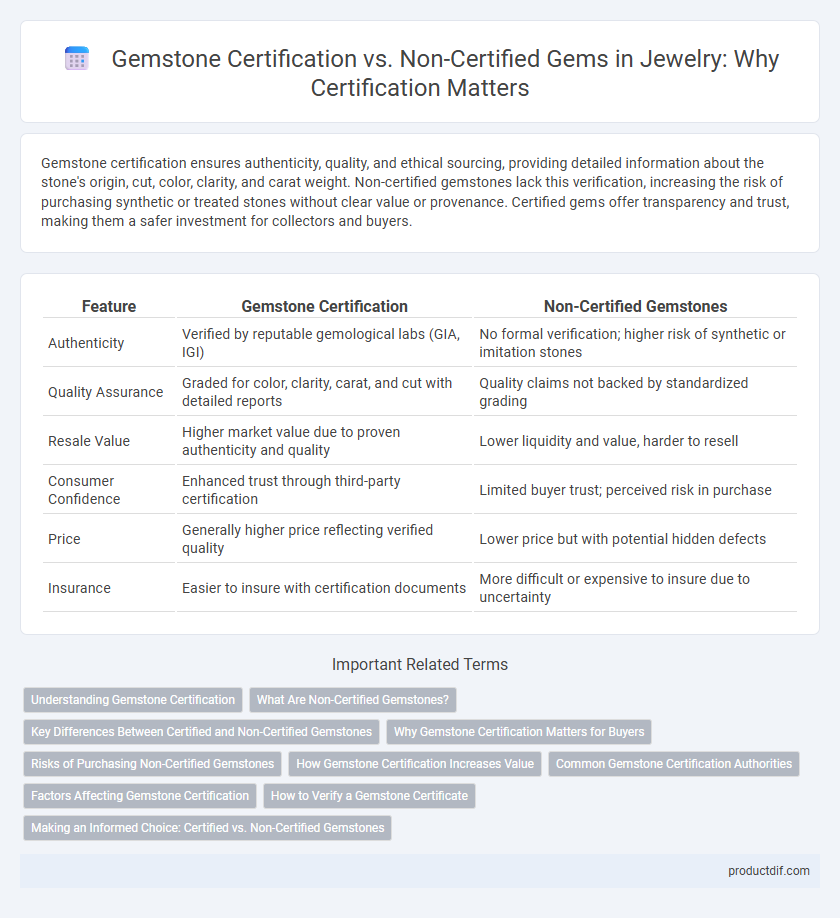Gemstone certification ensures authenticity, quality, and ethical sourcing, providing detailed information about the stone's origin, cut, color, clarity, and carat weight. Non-certified gemstones lack this verification, increasing the risk of purchasing synthetic or treated stones without clear value or provenance. Certified gems offer transparency and trust, making them a safer investment for collectors and buyers.
Table of Comparison
| Feature | Gemstone Certification | Non-Certified Gemstones |
|---|---|---|
| Authenticity | Verified by reputable gemological labs (GIA, IGI) | No formal verification; higher risk of synthetic or imitation stones |
| Quality Assurance | Graded for color, clarity, carat, and cut with detailed reports | Quality claims not backed by standardized grading |
| Resale Value | Higher market value due to proven authenticity and quality | Lower liquidity and value, harder to resell |
| Consumer Confidence | Enhanced trust through third-party certification | Limited buyer trust; perceived risk in purchase |
| Price | Generally higher price reflecting verified quality | Lower price but with potential hidden defects |
| Insurance | Easier to insure with certification documents | More difficult or expensive to insure due to uncertainty |
Understanding Gemstone Certification
Gemstone certification provides an independent evaluation of a gemstone's quality, authenticity, and characteristics, ensuring transparency and trust for buyers. Certified gemstones come with detailed reports from reputable gemological laboratories such as GIA, AGS, or IGI, highlighting attributes like carat weight, color, clarity, and cut. Non-certified gemstones lack this verification, increasing the risk of misrepresentation and reducing resale value.
What Are Non-Certified Gemstones?
Non-certified gemstones lack official documentation verifying their authenticity, quality, origin, and grading by recognized gemological laboratories like GIA or IGI. Without certification, buyers face increased risks of misidentification, undisclosed treatments, or synthetic substitutes, which can affect the gemstone's value and desirability. Choosing non-certified stones often means relying on the seller's reputation and personal judgment rather than standardized, objective assessments.
Key Differences Between Certified and Non-Certified Gemstones
Certified gemstones come with a detailed report from reputable gemological laboratories such as GIA or AGS, verifying their authenticity, quality, and characteristics including carat weight, color, clarity, and cut. Non-certified gemstones lack this official documentation, making it difficult to confirm their origin or value, which increases the risk of purchasing treated or synthetic stones. Certification enhances transparency, trust, and resale value, whereas non-certified gems often carry uncertainty and potential market depreciation.
Why Gemstone Certification Matters for Buyers
Gemstone certification provides buyers with verified information on the gemstone's authenticity, quality, and origin, ensuring transparency and trust in their purchase. Certified gemstones have undergone expert evaluation, which significantly reduces the risk of fraud or misrepresentation compared to non-certified stones. This assurance of quality and value is crucial for investment purposes and long-term satisfaction in fine jewelry acquisitions.
Risks of Purchasing Non-Certified Gemstones
Purchasing non-certified gemstones carries significant risks, including the potential for synthetic or treated stones being misrepresented as natural, which can lead to substantial financial loss. Without certification from reputable gemological laboratories like GIA or AGS, consumers lack verified information about gemstone quality, origin, and authenticity. This absence of trusted documentation increases vulnerability to fraud and undermines resale value and insurance claims.
How Gemstone Certification Increases Value
Gemstone certification provides verified information on authenticity, origin, and quality, significantly increasing a stone's market value and buyer trust. Certified gemstones are accompanied by detailed reports from reputable gemological laboratories such as GIA or IGI, ensuring transparency and reducing risks of misrepresentation. Non-certified stones often face price depreciation due to uncertainty in their quality and provenance.
Common Gemstone Certification Authorities
Gemstone certification from reputable authorities such as the Gemological Institute of America (GIA), American Gem Society (AGS), and International Gemological Institute (IGI) guarantees authenticity, quality, and ethical sourcing. Certified gemstones undergo rigorous analysis for cut, clarity, carat, and color, providing buyers with verified assurance and market value. Non-certified gemstones lack this expert validation, increasing the risk of undisclosed treatments, synthetic origins, or misrepresented characteristics.
Factors Affecting Gemstone Certification
Gemstone certification is influenced by factors such as the gemstone's clarity, carat weight, cut quality, and color, as these attributes are meticulously evaluated by gemological laboratories to determine authenticity and value. The presence of treatments or enhancements, origin verification, and the use of advanced technology like spectroscopy also play critical roles in the certification process. Non-certified gemstones lack this detailed evaluation, which can affect buyer confidence and market value.
How to Verify a Gemstone Certificate
Verifying a gemstone certificate starts with confirming the issuer's credibility, typically from renowned gemological laboratories such as GIA, AGS, or IGI, ensuring authentic grading standards. Examine the certificate details including carat weight, color grade, clarity, and cut, matching them precisely with the actual gemstone characteristics. Utilize online databases or contact the lab directly using the certificate number to authenticate the document's legitimacy and avoid counterfeit certifications.
Making an Informed Choice: Certified vs. Non-Certified Gemstones
Gemstone certification provides verified details on a gemstone's origin, quality, and authenticity, ensuring transparency for buyers. Non-certified gemstones lack official verification, posing risks of misrepresentation in color, clarity, and carat weight. Choosing certified gemstones empowers consumers to make informed decisions and guarantees investment security.
Gemstone Certification vs Non-Certified Infographic

 productdif.com
productdif.com